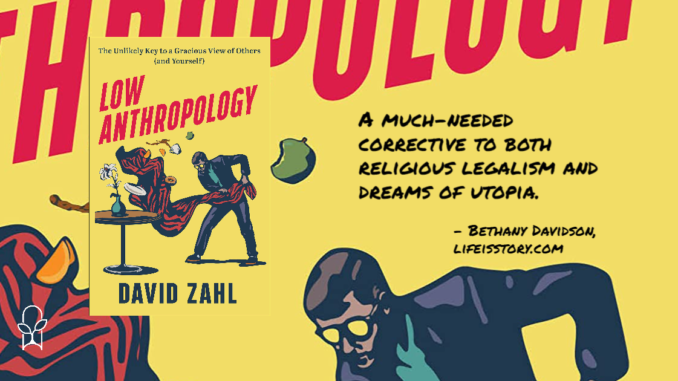
Published by Brazos Press on September 13, 2022
Genres: Non-Fiction, Christian Life
Buy on Amazon
Goodreads

Many of us spend our days feeling like we're the only one with problems, while everyone else has their act together. But the sooner we realize that everyone struggles like we do, the sooner we can show grace to ourselves and others.
In Low Anthropology, popular author and pastor David Zahl explores how our ideas about human nature influence our expectations in friendship, work, marriage, and politics. We all go through life with an "anthropology"--ideas about what human beings are like, our potentials and our limitations. A high anthropology can breed perfectionism, anxiety, burnout, loneliness, and resentment. Meanwhile, Zahl invites readers into a biblically rooted and life-giving low anthropology, which fosters hope, deep connection with others, lasting love, vulnerability, compassion, and happiness.
Zahl offers a liberating view of human nature, sin, and grace, showing why the good news of Christianity is both urgent and appealing. By embracing a more accurate view of human beings, readers will discover a lasting hope for others--and themselves.
In this unique book about grace, David Zahl encourages his readers to embrace a “low anthropology” of human nature. Although this sounds very academic, Zahl wrote this at the popular level, and he defines our anthropology as our set of beliefs about human nature. He challenges his readers that the best way to accept others and ourselves is to abandon lofty ideas about human potential and get real about the fact that we’re all limited, self-centered, and characterized by conflicting desires. Throughout the book, Zahl explores these issues, addresses common objections, and shows how lower expectations can help us cope with life’s challenges and become more gracious in our relationships, in our faith, and in the political sphere.
Although Zahl writes from a distinctly Christian perspective, the book is accessible to people of different beliefs. He clearly explains biblical concepts, shares examples that anyone can relate to, and offers general, practical takeaways. Nonetheless, Christian readers will glean the most from this book, as Zahl explores the biblical basis for low anthropology and shows how it fits within a philosophy of Christ-centered grace. The chapter about our need for low anthropology in religion is particularly helpful, as he shows how legalistic environments lack realism, not just grace. This chapter is a must-read, especially for Christian leaders, as Zahl explores the cost for people who want to honor God, but burn out from never measuring up to sky-high expectations.
Low Anthropology: The Unlikely Key to a Gracious View of Others (and Yourself) is thought-provoking, nuanced, and helpful. I found parts of it repetitive at times, and I would have appreciated more insight into how pessimists who naturally see the worst in themselves and humanity can become more gracious. This book is best for people who feel burnt out on high expectations and need a paradigm shift, but everyone can find wisdom here, and I would especially recommend this to ministry leaders, who often set the tone for how their churches or organizations view human nature and human capabilities. This book provides a much-needed corrective to both religious legalism and secular dreams of utopia, and can help readers grow in love and compassion for themselves and others.
